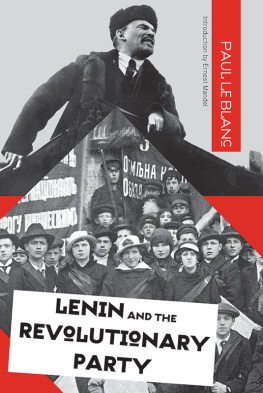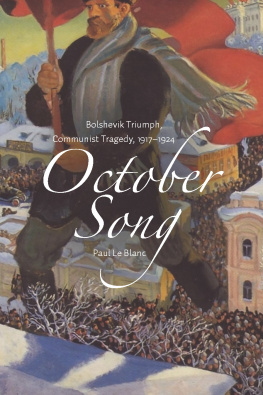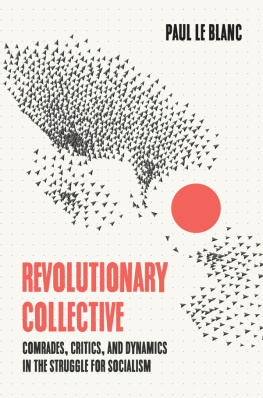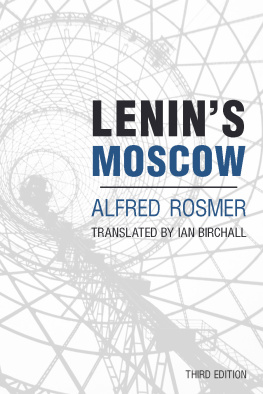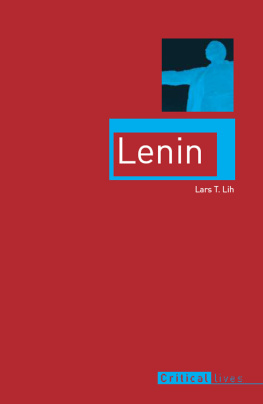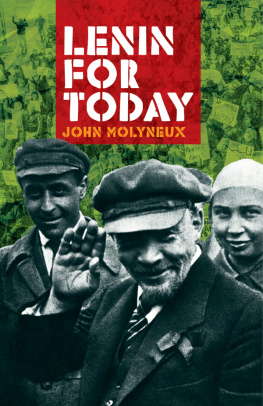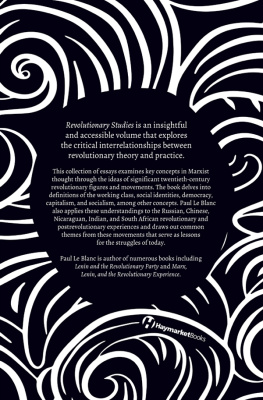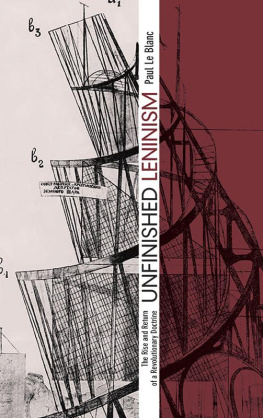Contents
1993 Paul Le Blanc
Published 1993 by Humanity Books in New York
This edition published in 2015 by
Haymarket Books
P.O. Box 180165
Chicago, IL 60618
773-583-7884
www.haymarketbooks.org
info@haymarketbooks.org
ISBN: 978-1-60846-677-1
Trade distribution:
In the US, Consortium Book Sales and Distribution, www.cbsd.com
In Canada, Publishers Group Canada, www.pgcbooks.ca
In the UK, Turnaround Publisher Services, www.turnaround-uk.com
All other countries, Publishers Group Worldwide, www.pgw.com
This book was published with the generous support of Lannan Foundation and Wallace Action Fund.
Cover design by Rachel Cohen. Author photo (cover flap) by Ashtyn Marino.
Library of Congress Cataloging-in-Publication data is available.
Note to the Haymarket Books Edition
Lenin was tough, and he was for the workers. Thats what my father told me as we drove in a car one summer, while I (in my early teens) accompanied him on one of his many trips as a union organizer. I was asking about, and he was explaining, his understanding of how the world was, and the ideas he believed in. When I asked him about Lenin, that is what he said. It stuck with me, and as I have labored to make sense of the things that culminated in Lenin and the Revolutionary Party , it seems to me my fathers assessment holds up well.
It is immensely gratifying that a new edition of this, my first published book, is being made available to a broader number of readers under the imprint of Haymarket Books. I know that my two mentors and teachers, George Breitman and Ernest Mandel, would have been especially appreciative that this volume would finally be available through the auspices of a substantial and respected revolutionary socialist publisher. As I have explained more than once, Breitmans inspiration and encouragement were decisive for this being written at all. It was he who enlisted Mandels incredibly meaningful support, which also resulted in Ernests outstanding introduction to the book, most of which is reproduced here. *
It is very good to know that Lenin and the Revolutionary Party has been useful (as I have been told innumerable times) for young activists. Such activists have been proliferating in the United States, where a radical ferment has persisted and finally accelerated over the past decadeleading to possibilities that certainly would have intrigued Lenin, but it is also the case globally that, as Bertolt Brecht once told us, because things are as they are, they will not stay as they are. As I have traveled to conferences and forums in so many different places since the publication of this bookAustralia, Brazil, Britain, Canada, France, Mexico, South Africa, Turkey, China, IndiaI have had the profound pleasure of connecting with bright, energetic, engaged young militants, precisely the people for whom Lenin and the Revolutionary Party was written. Some were not yet born when Breitman and Mandel were encouraging me, as the manuscript was struggling to become a book. I am also pleased that this twenty-five-year-old study harmonizes well (despite one or another interpretive difference) with the rising tide of contributions to Lenin Studies from such scholars (some well-known and some yet-to-be known) as Colin Barker, Eric Blanc, Sandra Bloodworth, Roland Boer, Sebastian Budgen, Kunal Chattopdhyay, Luke Cooper, Paul DAmato, Alexei Gusev, Tams Krausz, Ben Lewis, Li Dianlai, Lars Lih, Soma Marik, John Marot, August Nimtz, John Riddell, Alan Shandro, Peter Thomas, Wu Xinwei, and others.
The world of 2015 is quite different from that of 1990in regard to new scholarship and in regard to ever-changing realities. If I had to identify the Top Five must-read works relevant to this book, I would offer the following: Arno J. Mayers magisterial study The Furies: Violence and Terror in the French and Russian Revolutions (Princeton: Princeton University Press, 2000), provides a highly informed, honest, incredibly thoughtful historical contextualization for much that was problematical in the Leninist tradition. There is also Marcel van der Lindens historical survey of Marxists who struggled to make sense of the terrible outcome: Western Marxism and the Soviet Union: A Critical Survey of Critical Theories and Debates Since 1917 (Chicago: Haymarket Books, 2009). The three more contemporary-focused volumes, highlighting the activist ferment and radical possibilities of our time, would (at this moment) be: Paul Mason, Why Its Still Kicking Off Everywhere: The New Global Revolutions (London: Verso, 2013), David Harvey, Rebel Cities: From the Right to the City to the Urban Revolution (London: Verso: 2013), and Frances Goldin, Debby Smith, and Michael Steven Smith, eds., Imagine: Living in a Socialist USA (New York: HarperCollins, 2014).
Even in 1994 when the first paperback edition of Lenin and the Revolutionary Party came out, I was obsessed with the need to inform readers of important works (many new, a few older) that I had not been able to incorporate into my studyand also to factor in the sudden collapse of the Soviet Union and the meaning of this for the relevance, or presumed lack thereof, of a Vladimir Ilyich Lenin who, in Frederic Jamesons striking phrase, didnt know he was dead. The result was not only a new four-page introductory note but also an eighteen-page afterword. Rather than expanding upon these in the Haymarket edition, I have chosen to drop them altogether. There are four books I have produced that can take the place of those efforts, all of which refer the reader to new sources, but also do more than that. By referring readers to those books, I can save quite a bit of space in this one.
First came Marx, Lenin and the Revolutionary Experience: Studies of Communism and Radicalism in the Age of Globalization (New York: Routledge, 2006), which wrestles, among others things, with the much-vaunted collapse of Communism and with the post-9/11 world (surveying, as well, much radical history of the twentieth century, with some theology blended in) and offers reflections on the continuing relevance, in that new context, of what Lenin represented.
Next came the substantial, multifaceted introduction Ten Reasons for Not Reading Lenin to a collection that I editedV. I. Lenin, Revolution, Democracy, Socialism, Selected Writings (London: Pluto Press, 2008), which also includes informative sub-introductions to the various sections of the book plus an overarching documentation of the radical-democratic thrust of Lenins thought through the course of his life as a revolutionary, as well as suggestions for additional reading.
Third is the collection of my own writings, Unfinished Leninism: The Rise and Return of a Revolutionary Doctrine (Chicago: Haymarket Books, 2014). That volume takes up innumerable questions and controversies that have arisen over the past decade-and-a-half regarding ways to comprehend and to utilize (or not utilize) the Leninist tradition. It gives considerable attention as well to what has now become a veritable flood of Lenin Studies in our new century, with reflections on the meaning of such a development.
* In the final two pages of his introduction, Ernest included comments dealing with then-recent developments meant to highlight the books contemporary relevance. If he were alive today, he would most certainly want to revise these now woefully dated commentsbut since that is not possible, they are being left out. There are ample examples today of contemporary relevance which will undoubtedly occur to perceptive readers.
Introduction
I
Paul Le Blancs book represents an excellent analysis of the development of Lenins conception of the revolutionary party, from its inception until the immediate aftermath of the October revolution. This conception is dialectically linked with the Marxist conception of the self-activity and self-organization of the working class, which Lenin never abandoned, not even in What Is to Be Done?
Next page
